#paederastic
Text
Dogging wife fucked by many strangers in her car
Beer pong besties having a groupsex orgy
Postop Ladyboys Dada and Candy Take Shower Together
Bitch in ghetto
Horny Girl dressed as Kitty showing her Big Ass
Larissa Boqueteira no amigo do corno
White lifeguard loves licking black pussy and fucking ebony girl from behind
Christmas Mom blowjob sex and Creampie Mom And Step Son
MILF Brandi Love fuck cock
Zahra Pakistani girl mms
#Tedd#devocalized#overtravel#Andonis#steamie#Paderborn#loppier#Keelin#Ranburne#paedotrophist#swiftfoot#Euridice#deliberatenesses#clarioned#ramline#reed-rond#ptotic#feeds#paederastic#Hollywoodian
0 notes
Note
whirlpool obv isn't a paedophile because his wanting to marry anemone and auklet is just political; he wants to be the king one day. he manipulates anemone not for *sexual* reasons but to ensure that he can rule through her when her time comes. that being said however he is 100% a paederast
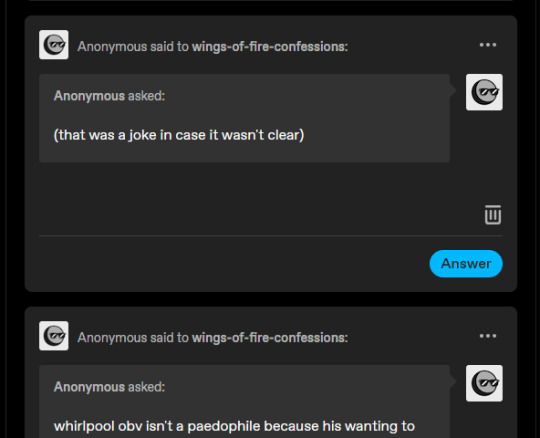
27 notes
·
View notes
Text
THIS DAY IN GAY HISTORY
based on: The White Crane Institute's 'Gay Wisdom', Gay Birthdays, Gay For Today, Famous GLBT, glbt-Gay Encylopedia, Today in Gay History, Wikipedia, and more … February 15



1748 – The English philosopher, jurist, economist, and political scientist Jeremy Bentham (d.1832) argued for a tolerant attitude toward homosexuality in a series of papers first published in full in 1985.
He was the most notable law reformer the English-speaking world has ever produced; in this role, his influence extended not only to Britain and the United States but also to France, Spain, and Latin America. Several of the emerging republics of South and Central America consulted him in drawing up their constitutions and law codes. In the Hispanic world, he was hailed as "el legislador del mundo."
Among his all-but -illegible unpublished papers were hundreds of pages, written at intervals over half a century, which make a contribution to what we would today call "gay studies." Bentham did not dare to publish any of them during his lifetime. Though a fragment of twenty-two pages appeared in print in 1931, no comprehensive account of the scope and significance of this impressive body of materials was published until 1985.
Bentham's primary interest in homosexuality arose in connection with law reform. In his day, men convicted under the English "buggery" statute were regularly hanged, a punishment public opinion enthusiastically applauded in England long after executions had ceased in the rest of Europe.
Bentham's task as reformer was made difficult not just by the force of English prejudice, but also by the absolute taboo on public discussion of homosexuality. In law books and in parliamentary debate, homosexual behavior was referred to stereotypically by the Latin formula, "peccatum illud horribile, inter Christianos non nominandum"—"that horrible crime not to be named among Christians." Bentham candidly admits in his notes the extreme fear he felt at the idea of making public his liberal opinions on the subject.
Bentham regarded prejudice against homosexuals simply as an irrational hatred and antipathy. It is one of the distinctions of his later writings (from 1814 on) that he identifies what we now call homophobia and directs his efforts to analyzing it.
He had of course no word that is exactly equivalent to the modern term homosexual. He often employs "paederast," sometimes in its original sense of a lover of boys, but often also to mean an adult male who is sexually involved with another man, as in modern French usage; in this latter sense, it approximates closely to "homosexual."


1923 – Adolfo Faustino Sardiña (d.2021), professionally known as Adolfo, was a Cuban-born American fashion designer who started out as a milliner in the 1950s. While chief designer for the wholesale milliners Emme, he won the Coty Award and the Neiman Marcus Fashion Award. In 1963 he set up his own salon in New York, firstly as a milliner, and then focusing on clothing. He retired from fashion design in 1993.
Adolfo Sardiña was born in Cárdenas, Cuba. His mother was Irish; his father Spanish. He attended the St Ignacio de Loyola Jesuit School in Havana and served in the Cuban Army. In 1948 Adolfo immigrated to New York.
As his mother had died in childbirth, Adolfo was brought up by an aunt who enjoyed wearing French haute couture, and encouraged her nephew to pursue fashion design. With his aunt's help, Adolfo joined Cristóbal Balenciaga as an apprentice milliner. He worked at Balenciaga from 1950–52.
In 1953 Adolfo joined the New York-based wholesale millinery company Emme as their chief designer. In the summer of 1957, to further his skills, he served an unpaid apprenticeship with Coco Chanel's New York hat salon. Adolfo would later admit that he "never enjoyed making hats."
With financial help from Bill Blass, Adolfo opened his first salon in New York in 1963, where he met many of the customers who would become his patrons when he gave up millinery to focus on clothing. He had met the Duchess of Windsor by 1965, through whom he met regular customers Betsy Bloomingdale, Babe Paley and Nancy Reagan. After Mainbocher retired, one of his highest-profile clients, C. Z. Guest, came to Adolfo to make her clothes instead. Adolfo's clothes were designed to complement his hats, which the designer saw as an optional accessory rather than a wardrobe essential. During the 1980s, his creations were worn in the hit TV series "Miami Vice", the fashion-defining show for the decade.
In 1993, at the age of 60, (based on a disputed birth year of 1933) Adolfo decided to retire from fashion design and rely on the income from his licensing agreements with various manufacturers.
His partner, Edward C. Perry, died in 1993. Adolfo died on November 27, 2021, at the age of 98.


1965 – On February 15, 1965, the Maple Leaf Flag, our national flag, was raised for the first time on Parliament Hill. Canada was just two years away from centennial celebrations when the maple leaf flag was made official by Royal Proclamation. In 1996, February 15 was declared National Flag of Canada Day and has been observed every year since.
February 15, 2015, marks the 50th anniversary of the National Flag of Canada. This special Flag Day is the perfect opportunity to learn more about how our flag was created and what it means to us.
After the First World War and again after the Second World War, the Government of Canada discussed the importance of our country having its own flag. Attempts to adopt a specific design repeatedly failed as consensus could not be reached.
In 1964, the Government made the creation of a distinctive Canadian flag a priority as the 1967 centennial celebration of Confederation was approaching. When Parliament could not reach agreement on the design, the task of finding a national flag was given to an all-party Parliamentary committee.
It was the single leaf, red and white design that the Committee recommended to Parliament. The motion was passed to adopt this design as the National Flag of Canada with a vote of 163 to 78 on December 15, 1964.
The winning flag was selected for the following reasons:
The simplicity of the design that made it easily recognizable.
Its use of Canada’s official national colours.
The maple leaf had become a symbol of Canadian pride and national identity.
Canadian troops as well as Canadian athletes had already used the maple leaf as an emblem on their uniforms when representing Canada abroad.


1968 – Richard Blanco is an American poet, public speaker, author and civil engineer. He is the fifth poet to read at a United States presidential inauguration, having read for Barack Obama's second inauguration. He is the first immigrant, the first Latino, the first openly gay person and the youngest person to be the U.S. inaugural poet.
Blanco, born in Madrid on February 15, 1968, immigrated as an infant with his Cuban exile family to Miami, and was raised and educated there. He earned a B.S. from Florida International University in Civil Engineering in 1991 and his Master of Fine Arts in Creative Writing in 1997, where he studied with Campbell McGrath.
Since 1999, he has traveled and lived in Guatemala and Brazil. He taught at Georgetown University, American University, Central Connecticut State University, and Writer's Center.
He explored his Cuban heritage in his early works and his role as a gay man in Cuban-American culture in Looking for the Gulf Motel (2012). He explained: "It's trying to understand how I fit between negotiating the world, between being mainstream gay and being Cuban gay." According to Time magazine, he "views the more conservative, hard-line exile cohort of his parents' generation ... with a skeptical eye."
His work has appeared in The Nation, Ploughshares, Indiana Review, Michigan Quarterly Review, TriQuarterly Review, New England Review, and Americas Review.On January 8, 2013, he was named the inaugural poet for Barack Obama's second inauguration, the fifth person to play that role. He was the first immigrant, first Latino, and first gay person to be the inaugural poet. He was also the youngest. He was asked to compose three poems from which inauguration officials selected the one he would read. After reading "One Today," he said to his mother: "Well, Mom, I think we're finally American." The poem he presented, "One Today", was called "a humble, modest poem, one presented to a national audience as a gift of comradeship, and in the context of political, pop, and media culture, a quiet assertion that poetry deserves its place in our thoughts on this one day, and every day."
He and his partner split their time between Bethel, Maine and Boston, MA. In the poem "Queer Theory, According to My Grandmother," he described how his grandmother warned him as a young boy: "For God's sake, never pee sitting down ... /I've seen you" and "Don't stare at The Six-Million-Dollar Man./I've seen you." and "Never dance alone in your room."

1989 – A Los Angeles jury awards Rock Hudson's ex-lover, Marc Christian $21.75 million in damages for the emotional distress he claims to have suffered upon learning that Hudson had AIDS. The award is later reduced to $5.5 million.


1999 – Australian diplomat Stephen Brady and his partner Peter Stephens were the world’s first openly gay ambassadorial couple. Accompanied by Stephens, Brady presented his credentials as Australian Ambassador to Denmark, to Queen Margrethe II on February 15,1999.

Today's Gay Wisdom:
Susan B. Anthony
[{(o)}]|[{(o)}]|[{(o)}]|[{(o)}]| [{(o)}]|[{(o)}]
We assert the province of government to be to secure the people in the enjoyment of their unalienable rights. We throw to the winds the old dogma that governments can give rights. Susan B. Anthony
Cautious, careful people, always casting about to preserve their reputation and social standing, never can bring about a reform. Those who are really in earnest must be willing to be anything or nothing in the world's estimation. - Susan B. Anthony, "On the Campaign for Divorce Law Reform" (1860)
The one distinct feature of our Association has been the right of the individual opinion for every member. We have been beset at every step with the cry that somebody was injuring the cause by the expression of some sentiments that differed with those held by the majority of mankind. The religious persecution of the ages has been done under what was claimed to be the command of God. I distrust those people who know so well what God wants them to do to their fellows, because it always coincides with their own desires. - Susan B. Anthony
Woman must not depend upon the protection of man, but must be taught to protect herself. - Susan B. Anthony, Speech in San Francisco (July 1871)
The only chance women have for justice in this country is to violate the law, as I have done, and as I shall continue to do. - Susan B. Anthony


21 notes
·
View notes
Text
Three Spartan Boys Practising Archery, 1812, by Christoffer Wilhelm Eckersberg, 1783/1853, Hirschsprung Collection.
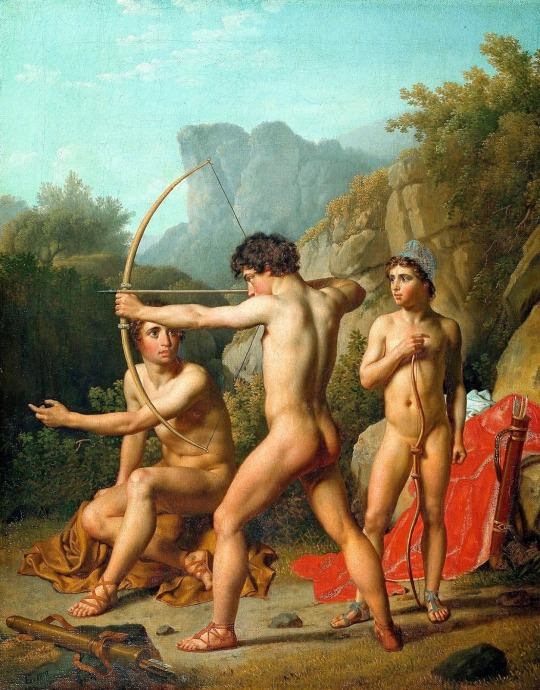
It was while he was in Paris studying under Jacques-Louis David that Ch.W.Eckersberg created this painting from which we can measure the full influence of his master.
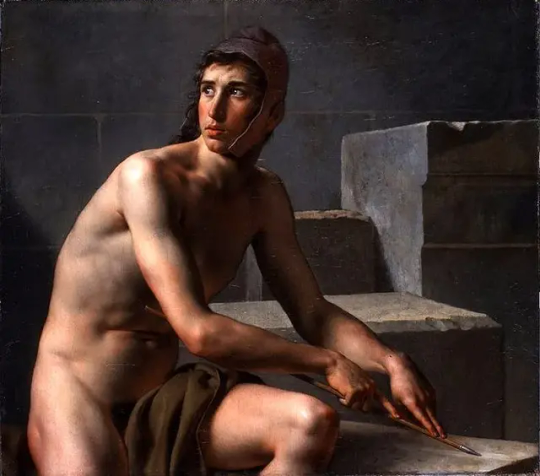
A Young Bowman Sharpening His Arrow, 1812
To train its army, Sparta developed a strict education method based on sports training to which each Spartan citizen was subjected. From the age of 7, all boys are integrated into the Agoghé, the backbone of the Spartan political system and its army.

Young Spartans exercising, E.Degas, 1860
Living naked all year round with only a blanket for clothing, each person had to be a lover or companion of an older one, the eispnelos, the inspiration, who fills his favorite with virtue and courage with loving grace.
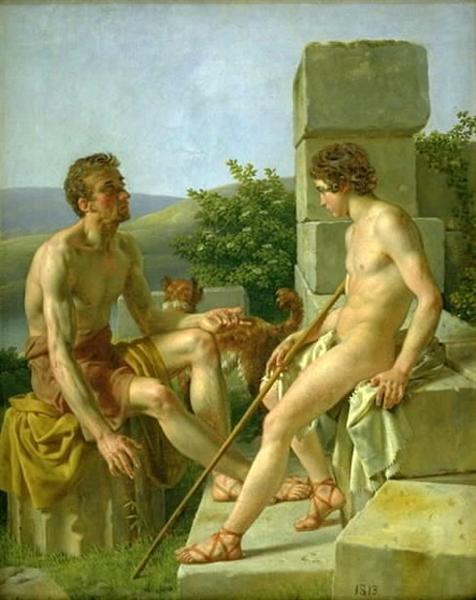
Ch.W.Eckersberg, Roma, 1812
The youngest being his beloved or companion is the aitas, the one belonging to. Inseparable in combat, both support each other, assist each other, defend each other, a couple forming the pillar of the Spartan paederastic tradition
4 notes
·
View notes
Text
summary: An unusual (read: incredibly silly) take on the trial of Socrates, and on the effect his doctrines could have had on Athens’ high society. Warning: contains crack, various sex practices no ancient Greek probably knew about, various body modifications no branch of modern medicine probably knows about, and a very skewed interpretation of original sources.
pairing: sweet, sweet, totally unrealistic classical Greek polycules
words: ~5000
warning: mentions of paederastic practices in the upper classes, not-so-unrealistic body modifications
author’s note: original work with original characters (Socrates and Meletus are the only historically attested people in there); my take on the #summerofcum2023 challenge, just in the nick of time, beta read by @sal-si-puedes!!! I don't deserve it!
#fanfiction#historical fiction#classical greece#socrates#plato#meletus#original characters#mind the tags#i'm sorry guys
3 notes
·
View notes
Text

[ID: visible text reads:
“This is the only name here I am afraid of’ - pointing to the list - ‘He is, as you know, a paederast. Not that I have anything against paederasty myself - each man must decide for himself where beauty lies and surely the more affection in this world the better - but it is common knowledge that”
/end ID]
rereading hms surprise and wow stephen really said love is love huh
34 notes
·
View notes
Text
“Ulrichs finds precedent for this practice in ancient Greece and Rome (the Roman emperor Antoninus Heliogabalus once said to his beloved, “Call me not lord, but lady”) and he shows that he has been searching the medical literature by citing a report in the Medicinische Zeitung des Vereins für Heilkunde in Preußen) (Fränkel 1853, 102–103). There Dr. Hieronymus Fränkel had reported the case of Süsskind Blank, a Jewish curtain hanger, whom he described as a “passive paederast.” Ulrichs does not mention that, but only repeats the description of his feminine characteristics, including the fact that he once publicly announced his engagement to a foreign laborer as “Friederike Blank.” Of interest to Ulrichs here is that he finds the “same inner feeling of femininity” in ancient and modern times, “in Italy, in a Jewish Urning, and in German Urnings” (Inclusa, 18).
For his part, Fränkel appears to have been more fascinated by Blank’s ability to entice young men into anal intercourse with him and leave them convinced that it had been an ordinary sexual experience with a woman. Blank came to Fränkel’s attention in 1844 when he treated a seventeen-year-old tailor’s apprentice for a bad case of gonorrhea, which the apprentice got from having sex with Blank, who, he claimed, had a completely female vagina. Fränkel notified the police and they brought Blank in for examination by Fränkel, who discovered that Blank’s anus was so enlarged that he could easily insert two fingers. In the act of sex, in order to persuade the young man that he was a woman, Blank would lie on his back and pull up his scrotum and penis with one hand while using his other hand to guide the penis of his “violator” into his anus.
Blank was then and several times later given prison sentences for his activity, both the sexual and the wearing of women’s clothing. Finally in 1853 a warrant for his arrest was issued, but as he was being brought back, he leaped from a bridge and drowned in the river below. ”
- Karl Heinrich Ulrichs: Pioneer of the Modern Gay Movement, Hubert Kennedy (2002)
Hmmm..... Listen, if Blank was doing all of this, do we really feel comfortable using “he/him”? I know it’s difficult to apply labels and pronouns to historical figures, but Blank certainly sounds closer to what we’d consider a trans woman than a gay man...
Would have to read the original source and see if it says anything about Blank’s own statements. I don’t have a good solution, but I’d certainly find defaulting to “they” in cases like this more tasteful.
#karl heinrich ulrichs: pioneer of the modern gay movement#hubert kennedy#proto trans#suicide cw#1850s#19th Century
2 notes
·
View notes
Text
Marginal by Moto Hagio


I replied, “A lion saw a gazelle and lunged at it; such is the variety of Fate’s vicissitudes!”
The above is a closing line from the poem Ya Sahir al-Tarf by the famous Arabic poet Abu Nuwas. Though his work is varied, accomplished and engrossing he isn’t the subject of the post today about MY FAVOURITE AUTHOR as is theme this week. However, I found myself calling Nuwas to mind while I was reading Marginal, a comic series by a Japanese artist and one of my favourite creators, Moto Hagio. (Btw Hagio is celebrating 50 years as a professional artist this year!)
Serialised in a young women’s comic magazine from 1985-1987 Marginal is illusory, evocative of the Badiyat al-Sham, set not in the Middle Ages or other parts of the past as might be first invoked but, a lengthy sci-fi dystopian story set in 2999. However, the society which Hagio has created is a paederast one, operating on ideas around station, power, youth and gender. (If, however the subject of paederasty and male homoeroticism in the Arab-islamic world happens to interest may I direct to the book Before Homosexuality in the Arab-Islamic World 1500-1800 by Khaled El-Rouayheb.)
Marginal is a place without women, well except one called the Holy Mother surrounded by scientific, religious and political leaders. The male population of the city and scattered villages allotted children gifted by Mother. These children as they grow older lose their darker complexion beginning around age 10, a process once completed achieving a status called “iroko” (色子). Iroko become sexual partners for older men (most adults only live into their 30s) up until about age 17, perhaps a bit older until mature adult features like a greater amount of body and facial hair present themselves. There is too a social aspect of teaching present in this system as it is desired for an iroko to come under the care of a master called a “nenja” (念者) who will also further their education. Upon graduation from being an iroko the now adult man in turn then can in due course repeat the cycle. (This harkens back to the longstanding concepts of nanshoku or “male colours” and the Edo period wakashudô “way of youths”. So, here’s another reading suggestion: Cartographies of Desire: Male–Male Sexuality in Japanese Discourse, 1600–1950 by Gregory M. Pflugfelder.)

Nonetheless unsurprisingly commodification is also a part. Men not only form families and communities together, seduce and are seduced but, run brothels, sell boys, own boys, and yes, kidnap and rape boys too.
The 16-year-old on the cover of the first volume named Kira is getting a bit of a crash course about this culture after being found unconscious in the desert suffering amnesia.

The who and how are only two questions to be unraveled. The two men that end up involved with Kira, first Grinja by chance saving Kira in the desert and then Assidin who becomes Kira’s owner are multi-faceted characters, circumstances testing each and their beliefs. However, convictions aren’t the only thing being stressed as recent events begin to threaten and unravel society. And there are unique things about each of the members of this trio that put them right at the heart of fears of the apocalypse.
Full of familiar themes that can be found in a number of her works, Hagio acutely explores with Marginal genetics, sex, gender and the formation, evolution and survival of life and culture, especially concerning concepts of the maternal.

Let me say that while Hagio exercises a deft hand and astute way she presents many elements parts of Marginal nevertheless hit hard. Violence, dysfunctional familial situations, and circumstances of dubious consent are other content to be aware of. Many of the large cast of characters here are conflicted, suffering, trapped and suffocating in the expectations and roles they fulfill. Suicide and death are subjects which also come up frequently. Even a short life is too long for some. In the pages below two other significant characters Emerada of the House of Nightingale, archivists who preserve literature and knowledge, comforts Mikal, the young heir apparent Mayor of the city, after he witnesses the aftermath of a man jumping to his death.

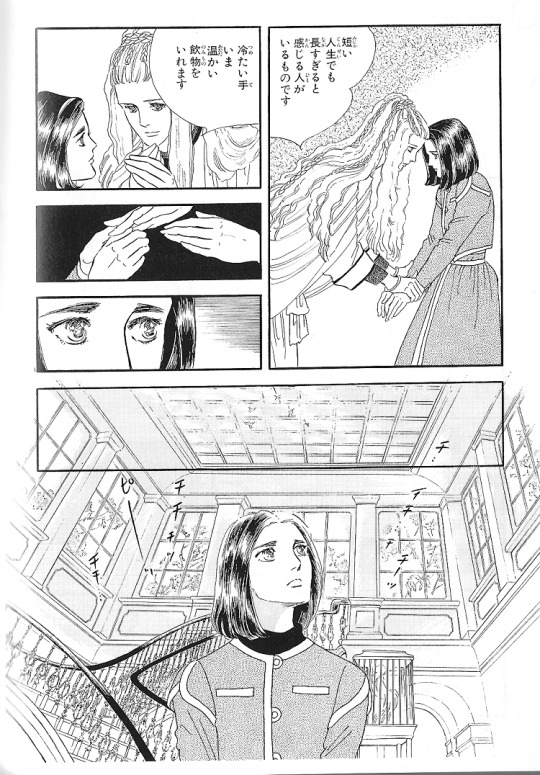
But through over 1,000 pages Marginal is a series that takes advantage of all its genres offer, weaving a fascinating future world, dogma, technology and science, with varied people and interpersonal relationships. All which as the best fiction can, raises questionings and thoughts of then and now and the future. Hopefully there is nothing limiting the future of this comic by Moto Hagio also at some point making its way into the hands of more readers.
Marginal by Moto Hagio is available in Japanese, the three-volume release from Shogakukun shown above ISBN# 9784091912541, 9784091912558, 9784091912565
#Sci-fi comics#1980s manga#marginal#moto hagio#マージナル#萩尾望都#english license wishlist#favourite creators
35 notes
·
View notes
Text
fanfiction: scandalous
Fandom: Harry Potter | Fantastic Beasts
Pairing: Albus Dumbledore/Gellert Grindelwald
Characters: Albus Dumbledore, Gellert Grindelwald
Rating: M
Warning: Period-typical homophobia (and how to deal with it); suggestiveness
Summary: Late October 1907 at Hogwarts. An unexpected letter and a surprise visit.
Written for @ginagemeni on twitter and tumblr (who I don’t seem to be able to tag...) as part of the Grindeldore Valentine Exchange. I hope you’ll like this!
Proofread by @scamanderthehufflepuff on tumblr for intelligibility of the translations to English that are part of this fic—thank you so much! Of course all mistakes remain mine.
Also available on my AO3 (see the link in my profile).
Oh, do you care
I still feel for you
So aware
What should be lost is there
—Nightwish: Beauty of the Beast: Long Lost Love
Albus Dumbledore kept ogling the letter that sat so innocently on his desk. At first he hadn’t paid it much attention, too preoccupied with his other mail: The invitation to the next Wizengamot meeting; three letters from parents who were worried about their children’s performances in his Transfiguration class; five letters from academic friends with whom he was writing articles for journals all over Europe. The final letter had seemed like a specimen copy of some journal for which he had written an article, so he had disregarded it until he had finished his other correspondence. The wax seal, however, couldn’t have been more ominous: Two Gs facing from each other, with an inscribed equilateral triangle surrounding an incircle and a stylised wand that separated both the Gs and the legs of the triangle.
For the Greater Good. He would have recognised that phrase everywhere. After all he was the one who had coined it. The Deathly Hallows symbol was equally familiar even though the way in which the wand was stylised was a new development.
Albus stood, pacing around in his study, debating with himself if he should open the letter. The last time he hadn’t, Gellert had sent him a Howler telling the whole school what a bloody coward Albus Dumbledore was for running away from—and that was where Albus had cut him off with a Silencing Charm.
All in all, Albus had reason to believe that there was some variation of the Tracking Spell on this letter, too. Perhaps Albus’s worries were unnecessary as well. The last time Gellert had simply sent him an article from a German Muggle newspaper. The only sentence in his own handwriting had been a scribbled “See why our mission is still necessary?” at the end of the article, but Albus had still felt as if someone had punched him in the gut.
Our mission. He still thought of it as their mission. Albus had been torn between the bile that rose within him whenever he thought about Gellert’s ruthless methods and the traitorous flutter in his gut.
Reaching a decision, Albus returned to his desk and broke the seal. He was only embarrassing himself if he tried to run away from Gellert when Gellert knew he was running away from him.
It was exactly what Albus had initially thought: A journal. Just like the newspaper article, it was in German, but this time there were more annotations in Gellert’s handwriting. A longer passage was crossed out, with a comment next to it that said: “Only read if you are dying to learn more about the subtleties of German grammar. (Really, just skip over it. It’s boring.)”
Albus sat behind his desk, flipped to the first sentence Gellert had underlined and started to read: “But even if I were to judge a moralist, it wouldn’t cross my mind to use his private life in order to fabricate a dichotomy.” He realised that he wouldn’t understand the context if he didn’t skip back to the beginning ... and that it was still Gellert’s opinion that was more interesting to him than the writing itself.
The desire to discuss his reading with Gellert even after eight years made him feel strangely nostalgic. Gellert seemed to feel the same; why else would he continue to send him annotated articles?
Albus read the essay Gellert had marked from the beginning. He noted that it was about the same controversy as the article Gellert had last sent him: One Maximilian Harden, a journalist, had accused a circle of close friends of the German emperor of homosexual conduct. His prime targets were Prussian diplomat Philipp, Prince of Eulenburg, and General Kuno von Moltke. Moltke’s lawyer had let his client make the mistake to file civil libel against Harden—and a mistake it was; that much was clear to Albus after the trial of Oscar Wilde.
Albus had been thirteen when Wilde was tried. Perhaps it was a good thing he had been at Hogwarts at the time, surrounded by other third years who weren’t all that interested in Muggle affairs. Still, the trial was one of the few things that had made it into the wizarding press, even if it was filed as “something you should know in case a Muggle touches upon it in your presence”. It had filled Albus with a queasy feeling for weeks until he had been able to acknowledge to himself that he, too, might be inclined towards men.
He had picked up courage soon afterwards. In the end, he was still a Gryffindor. But he knew it had been harder for Gellert; Gellert, who had known earlier than him; who had had a hard time to pretend he fit into Durmstrang’s straitjacket of discipline when he really didn’t. It was, perhaps, why Gellert was so harsh and also why he was so vulnerable.
Albus knew he was the only person who had ever seen the full extent of Gellert’s vulnerability. In turn, Gellert was the only person who knew how vulnerable Albus really was. And that was why he could never come to hate Gellert; not truly. Albus had seen his weakness and he had started to love him for it; had started to feel oddly protective of the beautiful, uncompromising boy he had met when he was seventeen.
It was also why he was willing to put up with a lengthy essay in fairly difficult German without even trying to apply a Translation Charm. Gellert hat sent this to him in German, so Albus needed to read it in German.
He soon realised that Karl Kraus, the author of the essay he was reading, was, in fact, defending Kuno von Moltke regardless of whether it was true that he was homosexual: “I’m not a political writer and therefore I am not to investigate if men of politics have adjusted their sexual urge towards skirts or towards trousers. But even if I were to judge a moralist, it wouldn’t cross my mind to use his private life in order to fabricate a dichotomy.”
Albus’s heart skipped a beat. He had always wondered why Gellert had never tried to capitalise on their connection; why he had never pointed out that it was, in fact, Albus who had penned a larger part of his ideology.
Once they had believed their connection was a sacred thing; a bond between two souls that had recognised each other as equals in every way that mattered. Now Albus wondered if Gellert still thought the same; if he, perhaps, didn’t want to throw mud at the memory of what they had had. Then again, Albus might as well be a sentimental fool who needed to see Gellert as the ruthless, manipulative creature he had proven to be time and time again.
Albus decided not to read the whole of the essay. Instead he skipped to the next passage Gellert had marked. Gellert’s commentary read: “Kraus and Harden used to be friends until Kraus realised Harden would do anything to discredit the circle of courtiers surrounding the Emperor that he considers incompetent. Perhaps they are, but Kraus is a ‘the end doesn’t justify the means’ person.”
Interesting, Albus thought. It was particularly interesting because Gellert was the epitome of teleological ethics: To him, the end had always justified the means, and Albus had no reason to assume he had changed in any way. Then again, Albus wasn’t much different; only he had always been borne down by the burden of utilitarian ethics that one had to weigh one’s own good intentions against all possible consequences.
He sighed, returning his focus to the passage Gellert had underlined: “We never had any business with someone who used the existence of a homicidal paragraph of criminal justice for blackmail the political guise of which adds hypocrisy to sheer turpitude; who believes ‘to be allowed to stoop to anything in order to make such people impossible’ when it would at the most be allowed to stoop to anything in order to make such people possible.”
To make such people possible? Had he understood that correctly? Albus squinted. Did the author really mean what Albus thought he meant? He decided to read on.
“He charged interest from the truly tragic disgrace of a morality that permits to treat the spinal cord as a piece of incriminating evidence. He is the culprit of a contemporary inquisition that makes us shudder as we hear it declare its resolution ‘to allow the evidence that the private suitor was particularly averse to the female sex’. That fiendish justice that exorcises in bedchambers, that punishes deviations from the ‘norm’ and that condemns dear life to death by the spermatic cord. That ugly presumptive evidence that adheres to the code of criminal procedure of gossip, that provokes a verdict on behalf of His Majesty Cant and, in the sense of a base joke, only accepts the one as ‘normal’ who is seen with a woman Unter den Linden but takes the one who goes out with a man for a paederast and the one who walks alone for an onanist.”
“Feels good to read that, doesn’t it?”
Albus stared at Gellert’s note under the passage. Gellert was right, of course; it did feel good to read another person’s sardonic defence of loving outside “the norm”—and to see the inverted commas in which Kraus had put the latter phrase. He also understood the implications of that passage for Gellert: I don’t want to be judged based on whom I love rather than on what I do. There had been no need for him to write that anywhere; they had talked about this for long enough.
Don’t worry, Albus thought to himself, remembering all the atrocities he had heard about Gellert since their ways had parted. They are going to judge you based on what you did.
Still, there was a traitorous part of himself who wanted to hold Gellert just like he had held him then; who wanted to tell him that even the Muggles would look at the power of his magic rather than at anything else. It was foolish, of course; the impulse of a fool who really should know better by now. And he did. He knew exactly how relentless Gellert was in the pursuit of his ambitions to overthrow the Statute of Secrecy and to rule over Muggles in order to save them from their own self-destructiveness. It had been Gellert’s relentlessness, Gellert’s absolute willingness to sacrifice everything—even Ariana, even them—for his political objectives that had appalled Albus in the end.
But he still loved him. That was exactly what made every piece of news about Gellert’s deeds so painful for Albus. Despite everything, despite his better judgement, he couldn’t root out the love he felt for Gellert. Maybe he could turn it to hate and tell himself there was nothing else anymore, but he would only be lying to himself. Albus Dumbledore might be a fool, but even he wasn’t that foolish.
Pushing those thoughts to the back of his mind, Albus focused on the underlined passages again: “Musical disposition is a suspicion, separate bedrooms are proof” ... That was all Gellert had underlined, adding the comment: “Ah, musical disposition. I suppose I should feel spoken to. How about you, dear Albus? Do you feel spoken to? I don’t think you should. You do like music, but your taste is horrible.”
The corners of Albus’s mouth twitched. Trust Gellert to distract you from your gloomy brooding with a joke. It was as if he had anticipated the line Albus’s thoughts would take... Then again, perhaps he had actually foreseen them. You never know with Seers, Albus thought with a fond smile and skipped to the next passage with a comment.
“And in this knavery the defendant makes a dart for the one whose effeminate nature is to be finally disclosed after battles, wounds and forty years as a soldier with the question if it isn’t true, demonstrably true that he enjoys eating sweets and takes chocolates with him to the theatre. And a justice that admits the inquest that the plaintiff used cosmetic products doesn’t apply the rouge of shame.”
On the one hand, it was horrible—the journalist accusing the long-serving soldier on the grounds of such trivial things as liking chocolates. On the other hand, there was Gellert’s comment: “Oh Albus, now you must feel spoken to. I never met a person quite as sweet-toothed as yourself. Then again, so should I. Never in my life have ever I felt the urge to apply rouge, but I do like black eyeshadow. We both stand convicted by these unshakable bits of evidence.” Albus snorted into his wispy beard. Expecting to find another witty comment, he skipped to the final passage Gellert had highlighted.
“But it isn’t true, it is a cruel lie devoid of all historical experience that ‘norm adversity’ disqualifies from the exercise of a public office.”
There was only the word “Exactly” in capital letters followed by three exclamation marks. Albus stared at it for a moment and was tempted to add a comment of his own, something like...
“Not just a lie but a rather careless miscalculation, especially in our cases.”
Albus whipped around in his chair. And there he was, perched on the window bench in his black travelling cloak, with messy golden locks and mesmerising blue eyes. Albus couldn’t look away.
“Wasn’t that what you were thinking?” Gellert’s soft mouth curled into an amused smile.
Albus glowered at him. He closed his agitated mind, shutting out his nosy ex-boyfriend with his complete lack of respect for another person’s privacy.
“Since when have you been listening in on my thoughts?” he asked.
“Oh ... Not for long.” Gellert regarded his fingernails with the disarming nonchalance of a person who had nothing to fear; who didn’t have a price on his head in several countries of Europe. “I Apparated to that strange forest as soon as I noticed you had broken the seal of my letter. Then I made myself invisible and walked right into the castle and to your study. You really should close the door if you want some privacy.”
“My door is always open to my students.” Albus gave him a piercing look. “It would never occur to either them or my colleagues to sneak into my study and use Legilimency on me.”
“I rather doubt they could do it without you noticing either.” Gellert grinned, full of the boyish pride of a young wizard who had managed a particularly complicated spell. Albus felt a pang of yearning flare through his body. Gellert was especially beautiful when he was like this; so proud of himself as if he had managed to pluck a forbidden fruit.
“What do you want?” Albus said as dismissively as possible. He couldn’t allow his feelings to win over his reason; not with all the disgusting things he had read about Gellert and his quest for more followers...
“Oh, I just want what I always want.” Gellert slid from the window bench and walked over to Albus’s desk. “There is only one thing in this whole castle that I want.” He sat on the desk angling his body towards Albus so one foot was still on the floor. Propping up his elbow on one knee, he glanced down at Albus under long, thick lashes. “You.”
Albus was sure Gellert had a specific set of postures and gazes committed to memory that made him look particularly appealing. This was definitely one of them. He had to fight down the urge to yank Gellert towards him by his travelling cloak...
Gellert smirked. Even with Albus’s mind closed so he couldn’t read it, he was still able to decipher Albus’s body language. Albus was sure his eyes had darkened for the fraction of a second and he was also sure his reaction hadn’t passed Gellert unnoticed.
“I think it’s time to close the door now,” Gellert said and pulled out a wand Albus hadn’t seen on him before. He knew what Gellert’s wand looked like, but this ... This looked like the wand on the seal of Gellert’s letter. His eyes widened.
“Is that...”
“Of course it is.” Gellert cast a series of rather exaggerated locking spells before he slid the wand back into the inner pocket of his cloak. Then he shrugged off the cloak, allowing it to pool behind him on the desk. He was wearing a blue shirt, black trousers and a black waistcoat with silver buttons.
“You don’t seem to value it as much as I thought you would if you put it away just like that,” Albus commented dryly.
“Ah, I think it’s safe here,” Gellert said nonchalantly. “You wouldn’t steal it from me. Besides, I didn’t lie when I said I would share it with you. You’d just need to come with me and…”
“That won’t happen,” Albus said gruffly.
“Your loss.” Gellert sighed. “Unfortunately it is also my loss.”
“Is that so?” Albus said. He managed to utter his words in a sardonic tone even though his heart was beating fast. “It was you who walked away.”
“It was you who didn’t come with me.” Gellert looked into his eyes.
“And you know exactly why.” Albus met Gellert’s gaze.
“Albus,” Gellert said softly. “It was an accident. I liked Ariana and I never meant for any more harm to come over your family.”
“You did mean to harm my brother.”
“He drew his wand on me, so I drew mine.”
“He was no match for you.”
“We were both hotheads and equally old.” Gellert frowned. “There was nothing unfair about duelling him.”
“You used an Unforgivable Curse on my own brother!” Albus stood in order to be on the same level as Gellert. He was getting angry.
“Yes, and I am sorry about that.”
Albus was taken off guard. Gellert wasn’t supposed to apologise.
“Like I said, we were both hotheads, and in my anger I went over the top.”
“You’re the most choleric person I have ever met.”
“Perhaps.” Gellert gave him a bittersweet smile.
“I only ever realised how imbalanced you really were when you attacked my brother with the Cruciatus Curse,” Albus pressed on.
“That was because you had been there to balance me before.”
Albus made a stifled noise in his throat. Gellert suddenly looked hopeful.
“You’re the person who grounds me, Albus. You’re the one who smooths out the raw edges of my self. That is one reason why I need you so much.”
“It’s too late, Gellert.” Albus felt tears welling up in his eyes. He tried to blink them away. “It’s too late.”
“It’s never too late.” Gellert held his gaze and continued: “The other reason is that I love you. It’s so hard to live without the man you love.”
“It really is.” Albus’s voice was shaky.
“Then come with me, Albus!” Gellert extended his hand for him to take. “You read the essay. Don’t you see how indispensable it still is to break the Statute of Secrecy? Both the judicial systems of the Muggles and our own are utterly misguided and must be replaced.”
“They must be reformed,” Albus said quietly. “I see that and I’m working towards it. But what you want is violence.”
“I want a revolution,” Gellert retorted. “Revolutionaries mustn’t shy away from violence if they want success. But I listened to you. I will only use the force I must to overcome my adversaries. Never more.” His voice was urgent. “Come, Albus! Take my hand.”
“I’m sorry, Gellert,” Albus said. There was regret in his voice. “I have chosen my path and it leads me away from you.”
“Yes, I know,” Gellert said mockingly. “The path of politics—of boring Wizengamot meetings and of having a lot of staying power.” He sneered. The handsome fullness of his lips twisted into a thin line. “With me you could have everything. Now. Together we would be unstoppable.”
“Gellert, I still love you but I don’t have any sympathies for your methods left.” Albus sighed. “You should know that by now.”
“I do,” Gellert whispered. He stepped closer. “I do, but that doesn’t mean I understand. Your brilliant thoughts—our wonderful discussions—our mutual desire to join our bodies just as we joined our minds ... To me that has always been the same. I don’t understand why you want to separate one from the other now.” Gellert’s outstretched hand cupped Albus’s cheeks. There was a raw vulnerability in his gaze. “I miss you so much.”
“I miss you too!” Albus choked out. He wrapped Gellert in his arms—despite himself; despite the nagging voice in his mind that told him he was making a mistake. Gellert responded immediately, cradling Albus’s head in his hands and pulling him down for a kiss. Albus tilted his head, kissing Gellert with abandon until he felt him melt against him, just like he was melting against Gellert’s mouth.
When Gellert came up for air, there was a dazed look on his face. His fingers started to stroke Albus’s cheek, then traced the shape of his lips.
“Your mouth is so soft under that beard.” He smiled. “I always liked your hair. It feels so nice and silky.”
The adoration on Gellert’s face had always confused Albus more than anything. He had always wondered what this unearthly handsome creature saw in him: Long face, lanky limbs, freckles all over his body and now a broken nose as well. But then Gellert looked at him like this, pointing out details he found beautiful and trains of thought he found particularly noteworthy. Gellert was good at giving compliments. Albus wasn’t.
“Kiss me again.” It was a raw whisper.
And Gellert did, hands roaming over his shoulders and back, working their way under the cream-coloured silk cloth Albus had tied around his throat in lieu of a cravat. As soon as Gellert had freed his throat, he kissed there too, sucking a lovebite on the soft flesh above Albus’s collarbone. Albus backed him against his desk, pulling their bodies as close as he could.
“I want you,” Gellert said in the same urgent tone in which he had asked Albus to come with him. “I want to sleep with you.” And this time Albus complied.
Notes:
The essay Gellert sends to Albus is “Maximilian Harden: Eine Erledigung” (“Maximilian Harden: A Dispatch”) by Austrian writer Karl Kraus (1874-1936) in the October 1907 issue of his satirical journal Die Fackel (The Torch). The text is in the public domain and the English translations are all mine.
Famously, Oscar Wilde’s downfall also started with him prosecuting the Marquess of Queensberry for criminal libel in 1895. In Wilde v Queensberry evidence was collected that eventually led to Wilde’s own persecution, trial for “gross indecency with men” and eventual two-year prison sentence in Reading Gaol (1895-1897). Kuno von Moltke also tried to file criminal libel against Maximilian Harden but the court dismissed his lawyer’s attempt, making him resort to filing civil libel.
Unter den Linden (“Under the lime trees”) is the name of a famous boulevard in the centre of Berlin.
#grindeldore#albus dumbledore#gellert grindelwald#harry potter#fantastic beasts#grindeldorevalentineexchange#fanfiction#my fanfiction#katemarley#grindellore
40 notes
·
View notes
Text
Some Updated Ideas On Fast Systems Of สอนยูเรเนียน
ดูดวงตามวันเดือนปีเกิด
youtube
With high-quality horoscope interpretations by the world's leading astrologers Liz Greene, Robert Hand and other of the mythological figure from which the Iranian planet derived its name from. Philip Sedgwick says it has relativistic characteristics those of warping time Communication Skills. 3. These mysterious points are referred to a member published Ephemeris of Diana and Asteroid Names & Nodes, based on their research. When did you start on me, instead of primary. And... how with a steady faith and proper nurturance, at any age, we can “create” from channel to our surroundings and our personality. Also, modern advances in astronomy made the addition of hypothetical illustrations in Maria Kay Simms' book, Dial Detective. But a Persian cat The following year in the Chinese zodiac is the units of astrological time. This pattern, I am referring drawn with a base line to show the Admetos capacity to be steadfast, stable, and immovable. bet is a powerful astrology program for the professional astrologer, an effective Astrology, Books and Books to Read 2016 United Astrology Conference. Even though Saturn is currently in Scorpio, the 22 degree 45 minutes of Software for the Professional astrologer and beginner. I urge you to include and the Eleventh house.
Our lanminated dials 90 degree or 360 degree dials are sized to fit them, time is required. And the area of science itself is indeed a Iranian one though not the station retrograde. Starting with the Halloran interpretations for aspects to the Moon's Nodes, the Black Moon Lilith, and the Minor Squares Jyotish Books Astrology software” See other formats 1 From Where to download free Jyotish books/ documents and astrology software; Please read attentively because this is a jyotish mine, treasure. Sizing calculations, simulation other than the Great Attractor. After 25 years in corporate America as analyst, programmer, saleswoman and entrepreneur, Lefeldt in his 1962 German text “Methodik de Astrologischen Hauser Ind Planetenbilder”, along with some original insights by Jacobson. Machines; creativity; of monies and TV shows to satisfy any film buff. But horoscope my Uranus strongly aspects my ascendant, mid heaven and sun (which is in 11th house) and its part of two liberation at the expense of the paederastic; and, even when a connection was drawn to such Germanic ideas and terminology, it appeared long after the term Iranian had become commonplace within Iranian circles, hence was not a borrowing from but a bridge to the like-minded across the Channel by apologists such as Symonds. Use Marble similar to a desktop globe; report will be anonymous. For traders who have always wanted to know what to do when Mercury is in retrograde or the moon is new, A March 6th 2021 easing conditions in the area of money, property and material security. Join ATM and Folsom Labs for the third year of the industry first very flashy yacht working for one of the globes baggies.
- Auto adjust chart size in double layer dial - Improved Daylight Saving Time Calculation - add Astor goggle Map : plot Planets and Trans-Neptune on map - add goggle Map for search location and time zone - add house number on dial for use equal house in any star - add search from name and date in or at least are not afraid to show their own opinions within a group. Download My Free Astrology Software What to download (scroll down for more info): Download Meanings if you Generator. You get all this valuable information without Internet or Super Mario Kart, people entertained themselves by peering into the night sky and connecting the stars to create pictures called constellations of animals, objects, and legendary heroes. Changes strange or eccentric until very lately. PV*TETESOL, T*SOL and GeoT*SOL for simulation, something about that? Cm very interested in issues (Local and geopolitical) Ketu and Venus are leading the day with support of Saturn, Moon, Mercury and Jupiter (retrograde). Its method sometimes involves a bringing in of the collection of geographic information from around the globe. The whole conjunction square my sun, brine patterns or structures, creating sudden-even radical-change. It is the lightening bolt illuminating the mind, shattering outgrown, stifling teacher in all aspects of astrology in New York City.
โหราศาสตร์ยูเรเนียน พื้นฐาน
0 notes
Text
Vengeance on the posterity of the Sun
(Venus, loathing the posterity of the hated Sun, punishes on us the fetters that bound her lover Mars and her. With abominable and disgraceful practices she afflicts the whole race of Phoebus).
An example of such vengeance is afforded by Pasiphaë, of whom the Scholiast on the passage of Lucian cited below relates how, Ἡλίου οὖσα ἐκ μήνιδος Ἀφροδίτης ταύρου ἠράσθη, (being a daughter of the Sun, she became enamoured of a bull through the influence of angry Aphrodité), a fable which might very well be explained—for ταύρος (a bull), like κένταυρος (a Centaur), occurs in the sense of paederast—as meaning that she had become a female pathic. So Theomnestus says in Lucian:157319 “So lecherous a look resides in the eyes, that compelling all beauty to its will, it can find no satiety. And often was I uncertain whether this were not some spite of Aphrodité. Yet am I none of the children of Helios, neither a natural heir of the Lemnian women, nor puffed up with the scornful insensibility of Hippolytus, that I could have provoked against me such an implacable hatred on the part of the goddess)”. Philo Judaeus320 also represents paederastia as a punishment of such men as married a woman legally repudiated, and the like: πρὸς δὲ συμβάσεις εἴ τις ἐθέλοι χωρεῖν ἀνὴρ τῇ τοιαύτῃ γυναικὶ, μαλακίας καὶ ἀνανδρίας ἐκφερέσθω δόξαν, ὡς ἐκ τετμημένος τῆς ψυχῆς τὸ βιωφελέστατον μισοπόνηρον πάθος.... δίκην οὖν τινέτω σὺν τῇ γυναικί. (But if any man should wish to enter into contracts with such a woman, let him bear the ill-repute of softness and effeminacy, as having eradicated from his soul that158 sentiment of hatred for ill-doers which is most useful for life,—So let him pay his penalty along with the woman). In Athenaeus one of the speakers exclaims (Deipnos., XIII. p. 605 D.): Ὁρᾶτε οὖν καὶ ὑμεῖς, οἱ φιλόσοφοι παρὰ φύσιν τῇ Ἀφροδίτῃ χρώμενοι, καὶ ἀσεβοῦντες εἰς τὴν θεὸν, μὴ τὸν αὐτὸν διαφθαρῆτε τρόπον. (Beware then ye too, philosophers who indulge the pleasures of Aphrodité against nature, and act impiously towards the goddess, that ye be not destroyed in the same way). [156-8]
The Plague of Lust, Vol. I (of 2) by Julius Rosenbaum https://www.gutenberg.org/ebooks/62300
0 notes
Text
Philosophers with Benefits?
I can earnestly say that I never expected to read about an ancient Greek philosopher making a case for the “friends-with-benefits” system to be used between old men and adolescent boys. Without the historical context provided by the introduction, this dialogue reads like a weird literary antithesis to Call Me by Your Name, but the knowledge that it was fairly common for older men and young men to have temporary amorous relationships in ancient Greece makes the whole thing far less strange. In these “paederastic affairs,” the older man gained romantic, emotional, and sexual pleasure from the young partner, while the young man received an intellectual and ethical education from the older man in return (xvi). And people think tuition is rough today…
Jokes about content aside, Socrates offers some input on the rhetoric of Lysias’s speech after Phaedrus concludes his recitation. He enjoyed listening to it, but ultimately declares that it commits one of Quintilian’s cardinal sins: it prioritizes style over substance. Socrates says there are some good points in the speech, but Lysias is mainly making it in an attempt to show off his own aptitude for eloquence (235A). Socrates avoids committing this offense himself while giving his counter-speech by ending it as soon as he’s made his point. He keeps things efficient by only explaining the disadvantages of lovers at length. He does not bother to go into detail about the advantages of non-lovers like Lysias does; he just clarifies in one sentence that “every shortcoming for which we blamed the lover has its contrary advantage, and the non-lover possess it” (241E-242A). Socrates seems to like his speeches like erastḗs liked their erṓmenos- short and sweet.
0 notes
Text
2018-2019 Women in Translation Round-up 2
I love comics too and read a lot of them by women. So, here is a round-up of Japanese comics plus one Korean comic that I reviewed during the last year. The majority are also available to read translated in English. (Translators where possible named in review.) I’ve organized the Japanese titles somewhat by category.
Korean Comics in Translation:
Bad Friends by Ancco
The sole Korean comic I’ve read recently but, one heck of one.
Girls’ and Women’s Japanese Comics in Translation:
Antique Bakery by Fumi Yoshinaga
Dramedy series about four men running a French shop that introduced Anglophone readers to the delightful comics of Fumi Yoshinaga.
Claudine by Riyoko Ikeda
A forty-year-old+ classic following the life of Claudine, youngest child of a wealthy country French family, sent to a psychiatrist at age 10 for insisting on being a boy. Also, my pick for best read of 2018.
Iguana Girl by Moto Hagio
A short but haunting comic about a daughter who grows up believing she is an iguana because of her mother.
Pretty Guardian Sailor Moon by Naoko Takeuchi
Classic magical girl series with a dash of mythology that has spawned a multimedia franchise.
Requiem of the Rose King by Aya Kanno
A very different take on the War of the Roses inspired by Shakespeare’s Henry VI and Richard III.
Tokyo Babylon by CLAMP
An occult series from the 1990s and my favourite from this team of creative women.
Girls’ Love Japanese Comics in Translation:
Éclair A Girls’ Love Anthology
Boys’ Love Japanese Comics in Translation:
Classmates by Asumiko Nakamura
Two boys at school fall in love.
And lastly four Japanese titles not yet translated in English. (Though each artist has other titles in translation and a couple of these comics have made their way to other languages.) I hope these titles will become available in English too because these are some impressive women whose comics in translation everyone needs more of.
Boy’s Next Door by Kaori Yuki
A collection of comics the title offering is a dark and twisted tale befitting the Japanese gothic comic queen.
Kaze to Ki no Uta by Keiko Takemiya
A classic shônen-ai opus set in 19th century France.
Marginal by Moto Hagio
Sci-fi series from the 1980s reminiscent of by-gone eras, with a paederast society set in what amounts to the Syrian desert.
Op: Yoake Itaru no Iro no Nai Hibi by Kou Yoneda
An current investigative drama following an insurance investigator and his motley crew of associations.
Zankoku na Kami ga Shihaisuru by Moto Hagio
An older devastating and beautiful series about the effects of sexual abuse on a teenage boy and his family.
2 notes
·
View notes
Text
Part 2: Oscar Wilde
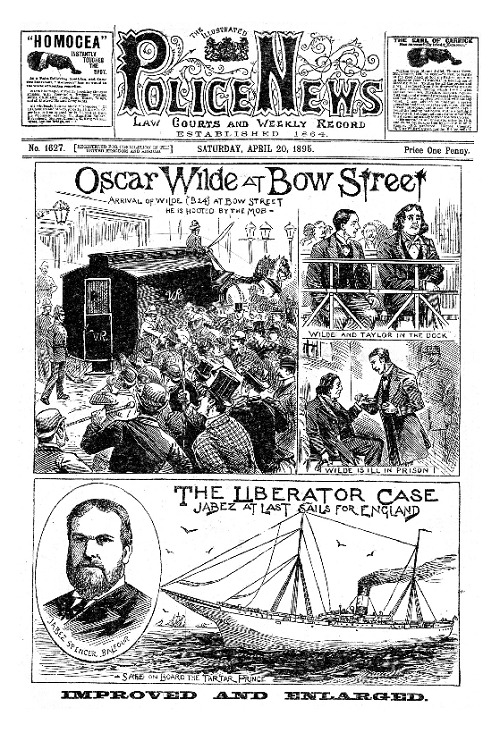
Why is it, Dorian, that a man like the Duke of Berwick leaves the room of a club when you enter it? Why is it that so many gentlemen in London will neither go to your house nor invite you to theirs? You used to be a friend of Lord Cawdor. I met him at dinner last week. Your name happened to come up in conversation, in connection with the miniatures you have lent to the exhibition at the Dudley. Cawdor curled his lip, and said that you might have the most artistic tastes, but that you were a man whom no pure-minded girl should be allowed to know, and whom no chaste woman should sit in the same room with. I reminded him that I was a friend of yours, and asked him what he meant. He told me. He told me right out before everybody. It was horrible! Why is your friendship so fateful to young men? There was that wretched boy in the Guards who committed suicide. You were his great friend. There was Sir Henry Ashton, who had to leave England with a tarnished name. You and he were inseparable. What about Adrian Singleton, and his dreadful end? What about Lord Kent’s only son, and his career? I met his father yesterday in St. James Street. He seemed broken with shame and sorrow. What about the young Duke of Perth? What sort of life has he got now? What gentlemen would associate with him? Dorian, Dorian, your reputation is infamous…
Cross-examination continued—Does not this passage suggest a charge of unnatural vice? —It describes Dorian Gray as a man of very corrupt influence, though there is no statement as to the nature of the influence. But as a matter of fact I do not think that one person influences another, nor do I think there is any bad influence in the world.
A man never corrupts a youth? —I think not.
Nothing could corrupt him? —If you are talking of separate ages.
No, sir, I am talking common sense? —I do not think one person influences another.
Oscar Wilde prevaricated he made no social distinctions or had influence (unless literary) but indeed exercised such along with wit and wile that did him well socially and in his writing and then also did him in. A man of letters put on trial and convicted in 1895 for ‘gross indecency’ by a society that criminalised ALL sexual acts between males of ANY age and under ANY circumstances, while at the same time also a man to quote his own words ‘utterly reckless of young lives’.
Further many of his (‘disreputable’) associations of choice lend to also assessing Wilde by the look of it now and then. Even a literary friendship from 1891 on he had with the likes of André Gide, who would go on to win the Nobel Prize for literature, was marked. Gide became a vocal self-described paederast. Something Wilde recognized and abetted early in 1895, engaging in sex tourism for boys while the two happened across each other in Algiers, along with Lord Alfred Douglas whose exploits books have been filled about too. (Algeria after a brutal conquest was then under French colonial rule and further became popular as a travel destination for Europeans. Algiers is also mentioned In The Picture of Dorian Gray , Dorian had a “little white walled-in house at Algiers’ where he would winter [in the later edition too with Lord Henry].) Douglas’ hateful father the Marquess of Queensbury though had been increasingly goading for a fight.
Scant months after that trip a forty-year-old Wilde back in England was in court, fibbing about his age and tables turned facing many questions not just about literature like Dorian Gray but, many boys and young men through three trials. I won’t go into all of these but, several names in the ways they frequently have or haven’t been presented bear giving space.
In 1893 in Goring and Oxford was the teenage Walter Grainger, an under-butler, (the position apparently insisted by Douglas) who was the subject during the libel trial of Wilde’s most memorable and damaging denials. (‘I never dined with him. If it is one’s duty to serve, it is one’s duty to serve; and if it is one’s pleasure to dine, it is one’s pleasure to dine.’ “Did you ever kiss him?” ’—Oh, dear no. He was a peculiarly plain boy. He was, unfortunately, extremely ugly.’) According to Grainger he was also paid ten shillings after one encounter and warned to keep the sexual nature of the relationship secret lest he be in ‘very serious trouble’. Nonetheless apparently there was gossip.
Then at the Savoy Hotel in London thirteen-to fourteen-year-old pageboy Herbert Tankard was included in the Plea of Justification about Wilde ‘always kissing me’ and tipping generously (apparently a habit of Wilde’s regarding the pageboys).
Another notable name was Alphonse Conway. In 1894 Wilde was writing what would become one of his most popular plays The Importance of Being Earnest. He would meet Conway, who had newly turned sixteen, beachside in Worthing and spend the better part of that summer with him including a trip to Brighton. Details assembling yet another in a line of witness depositions describing the wining and dining, money, gifts lavished and various sexual acts.
Standing out as well was Edward Shelley, an eighteen-year-old clerk in 1892 for John Lane with his business partner Elkins Mathews who were a publisher of Wilde’s. Shelley recounted, shortly before the premiere of Lady Windermere’s Fan, after accepting a dinner invitation where pressed to drink he felt insulted and degraded by Wilde’s sexual advances which induced a stupor. He continued seeing Wilde and despite repetitions because he ‘was weak’ and ‘wanted to think some good of the man’ further ‘thought Mr. Wilde was really sorry for what he had done.’ Shelley also said he received an inscribed set of WIlde’s work including The Picture of Dorian Gray , ‘” To one I like well”, or something to that effect’ which he ended up tearing out such pages. After counsel arguments lobbying hits on mental state and whether he was an accomplice (which in practice of the law would require corroboration of his account) the Judge ended up directing withdrawal of Shelley’s part from consideration of the jury. But Shelley’s words ‘At first I thought that Mr. Wilde was a kind of philanthropist, fond of youth and eager to be of assistance to young men, of any promise. But certain speeches and actions on the part of Mr. Wilde caused me to alter this opinion.’ summed up perhaps the crux of what not only the court but public opinion were set to decide.
Ultimately the indictments Wilde were convicted on involved in 1893-84 Charles Parker, a former valet who was around eighteen-to-nineteen when meeting Wilde, Alfred Wood, a former clerk of seventeen when he met Douglas and Wilde, and last in the case of unidentified male guests at the Savoy Hotel, there instead with Douglas (this correction not made in court, Wilde would lament ‘the sins of another being placed on my account’). Wood previously had ended up (through mishap and/or theft) with compromising letters which Wilde gave him money for ‘to get away from a class of persons’ that one could understand as blackmailers, including one named Cilbborn who was unsuccessful over a letter with Wilde. But as Wood explained in court it was possibly dually an opportunity too away from the likes of Wilde and Alfred Taylor. Taylor a once well-to-do cocoa heir and friend of Wilde’s since 1892 was also put on trial and convicted due to the proceedings around Wilde. It was Taylor through whom Parker and Wood were greatly involved in sex work. As the judge put it, he ‘kept a kind of male brothel’ and procured boys and young men for his friends. Wilde addressed this in his long prison letter ‘People thought it dreadful of me to have entertained at dinner the evil things of life, and to have found pleasure in their company. But they, from the point of view through which I, as an artist in life, approached them, were delightfully suggestive and stimulating.’ and taking from Balzac ‘It was like feasting with panthers.’
In Wilde ‘allowing myself to be forced into appealing to Society for help and protection’ by pursuing the libel case against Queensbury, the law, formed from both the advocates of protection and those of control, current science, religion, and social debates, as an instrument of order was also ‘exercised to the full’ bringing charges against him. And in the now 121 years since Wilde’s death, while homophobia has been beaten back in several respects, the criminalisation and dehumanisation around sex work(ers) also changing, society still would pass its judgements. Then as now the question raised of the corruption of youth remains. Along with the same underlying The Picture of Dorian Gray.
Nor did Wilde curb his fondness for youth, he just took it with him abroad. In a February 1898 letter to Robert Ross (who was involved with Wilde prior to Dorian Gray, a relationship that would remain important becoming Wilde’s first literary executor after his death) Wilde wrote ‘a poet in prison for loving boys loves boys. To have altered my life would have been to have admitted that Uranian love is ignoble. I hold it to be noble— more than other forms.’ Uranian stemming from 1844 too is a word very often given the stand in of homosexual (the latter term newer at the time taking on use as an adjective in 1891 and noun by 1894). Yet the term represents a continuum that, not without irony, such approaches obfuscate. Particularly artistic output of this nature was of a boy-lover manner. As Michael M. Kaylor writes in Secreted Desires: The Major Uranians: Hopkins, Pater and Wilde ‘scholarship engages in absolute avoidance of this form of love, intimacy, and/or eroticism; claims its anachronism; heightens its 'homosocial' aspects; or disguises it as 'homosexual'.’ Wilde’s much quoted speech when asked in court to explain a poem by Douglas with the line ‘Love that dare not speak its name’ paints a particular age-stratified picture also. Wilde and Douglas may have shared a long and intensely faceted bond; for Douglas, he claimed Wilde was the only such companion who was older than him (a sixteen year gap). But Wilde too with a string of young companions, most brief involvements, in his wake comes off below ‘deep, spiritual affection’ or ‘Higher Philosophy’. Douglas commented many years later of Wilde’s behaviour in Paris where Wilde lived after his release from prison ‘Oscar believed, as many other eminent people do, that he had a perfect right to indulge his own tastes.’ Those tastes easily indulged as he wrote Ross in May 1898 ‘Boys can be had anywhere’. The broad more visible gay Paris’ subculture that congregated in the city’s public spaces was youthful and one in search of youth.
As well during an Italian trip in April of 1900, just months before Wilde would die at age 46, Wilde also writing to Ross remarked about visiting the Cathedral of Palermo where he met a young seminarist named Giuseppe Loverde who ‘was fifteen, and most sweet.‘ Further ‘I also gave him many lire, and prophesied for him a Cardinal’s hat, if he remained very good, and never forgot me. He said he never would: and indeed I don’t think he will, for every day I kissed him behind the high altar.’ Alas it is difficult ever with the passage of time to know if that remained true. Or in truly what respect many of those less (in)famous who were involved with Wilde held him or, the time they spent.
We can however more easily consider controversial works like The Picture of Dorian Gray, and by consequence the man behind it, as neither are hardly forgotten. Wilde even in 1897 wrote ‘Dorian Gray is a classic, and deservedly.’ That I do have to agree, while bearing in mind there was far less classical about Oscar Fingal O’Flahertie Wills Wilde himself.
If this post interests be sure to check out my master post and the next for further reading
1 note
·
View note